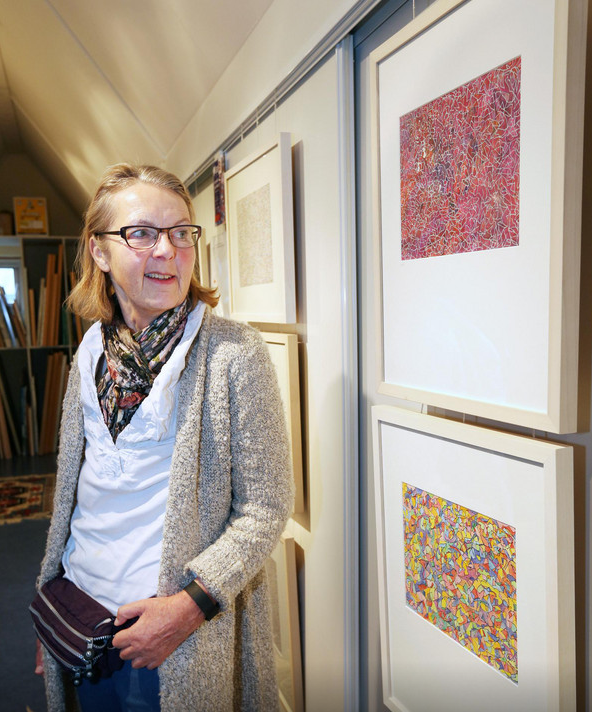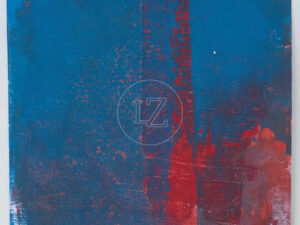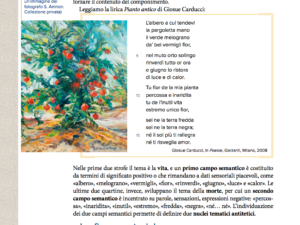
Proud to be able to share with you today’s publication in AD Den Haag about my Plan B in-home-gallery exposition!
http://www.ad.nl/den-haag/tekenen-als-therapie~a3b87bf7/
Publication translated into English:
Drawing as Therapy
Breast cancer, chemotherapy, and then a stroke; Liz Strick has suffered a lot in recent years. Her exhibition, entitled “Plan B”, illustrates how her rehabilitation programme crossed over into the realm of art. “I had to rediscover who I was”.
Liz Strick was completely incapacitated following a stroke in 2014. She had to relearn how to walk, move and talk. It seemed unlikely that painting, which had been both her occupation and her passion, would ever be a realistic prospect. In spite of that, the artist took hold of a pencil and began to draw. The resulting drawings surprised everyone, but especially Liz herself.
The “Plan B” exhibition is set up on the fourth floor of her home in Ypenburg. The exhibits represent a year’s worth of rehabilitation with a pencil between her fingers and what surfaced within her as a result. It is an overview of the work she has completed in 2016 and a coming full circle of the urgency she felt to keep drawing. “I am very proud of the outcome”, she says.
The exhibition consists of drawings and collages. The works are characterised by a distinctive tangle of lines seemingly without beginning or end. This is Liz’s left hand, over whose movement she has no control, but which wants to move in criss-cross fashion across the sheet of paper. “Here you can see that the degree of pressure on the pencil tip amongst all these lines varies considerably, which has resulted in an intangible depth”, she says of a drawing entitled “The Rose”.
The black and white drawing doesn’t particularly stand out amongst the other more colour-rich exhibits, however Liz counts it as her most special piece of work. “This was my first piece of work after the stroke. I dedicated it to my physiotherapist, who inspired me to re-engage with the possibilities in my life.
In 2013, Liz was diagnosed with breast cancer. It was the beginning of a period of fighting back: the chemotherapy did strike its target, but damaged her heart in the process, which in turn a year later led to her suffering a stroke. The left side of her body was completely paralysed. Then after a year of rehabilitation, when she had just regained the ability to walk tentatively, she fell at home down the stairs and broke her hip.
“I couldn’t do a single thing anymore, even sleeping was impossible. It was a really dark period of my life”, she says. A painting entitled “The Beginning of the End” translates her feelings in that moment, the lines giving form to what appears to be a tapestry that is in the process of unravelling and becoming progressively more frayed.
QUOTE: “As soon as I picked up the pencil I discovered that I could make some really beautiful things with it.”
Her physiotherapist did a lot of work on her left hand, with which up until that point she had been unable to hold a pencil. “At a certain point he suggested that I
should try to hold a pencil, as a means of therapy. I became progressively more enthusiastic about the idea that I might one day be capable of creating something again.”
Although the artist is originally right-handed, she now uses only her left hand when drawing, determined to regain sensation in this hand once more. Her less constrained right hand is used to assist, she explains. She cuts the drawings up by binding them together and moving a scissors through the paper with her right hand. She sticks the cut-up pieces onto other drawings. In this way they form a mosaic-like collage.
“I didn’t want to give up. Precisely because of maintaining continued movement I have been able to do more and more things. I had never drawn with my left hand, but now it had become necessary. I was forced to rediscover myself and achieved this by means of a kind of primal force, in order to continue to pursue my heart’s desire.”
Whoever visits the artist at home is treated to a review of some of her earlier work as well. Before she became paralysed, she made paintings in which it is evident that her time spent in Turkey (where she lived for many years) plays a big role. These paintings are quite different from the art that she now makes, but are for Liz also a memory of how her life once was.
QUOTE: “With this exhibition, I want to promote the notion that everything is possible. You must never lose hope – that is extremely important.”
“Painting has always been everything for me and that is still the case today. Without art I would not have been able to achieve what I have – it has most definitely helped in my rehabilitation. The exhibition is a celebration of this achievement.
Alongside this, Liz also wants to impart a message to others who live with restrictions / constraints in their lives. “With this exhibition, I want to promote the notion that everything is possible. You must never lose hope – that is extremely important.”
How the future will pan out is uncertain. Liz chose to exhibit her work at home on this occasion because a public outdoor exhibition is still beyond her to arrange. Even at home, people who are interested in the exhibition can’t just walk in.
“There are still many things I cannot do. For example, I don’t have any sense of time any more. If I have an appointment, I have to write it down. I also sometimes have difficulty with public speaking.” In spite of this, the artist ultimately hopes to be able to exhibit her work once again in public exhibitions. “This is what I am working towards.”
The “Plan B” Exhibition can be visited at Veenpluis 16 in The Hague, but only by appointment. To make an appointment, please send an email to info@lizstrick.com.




